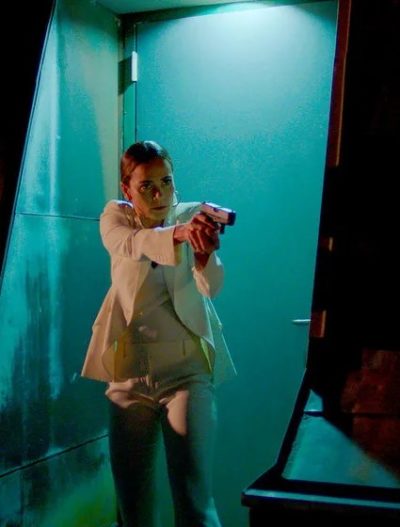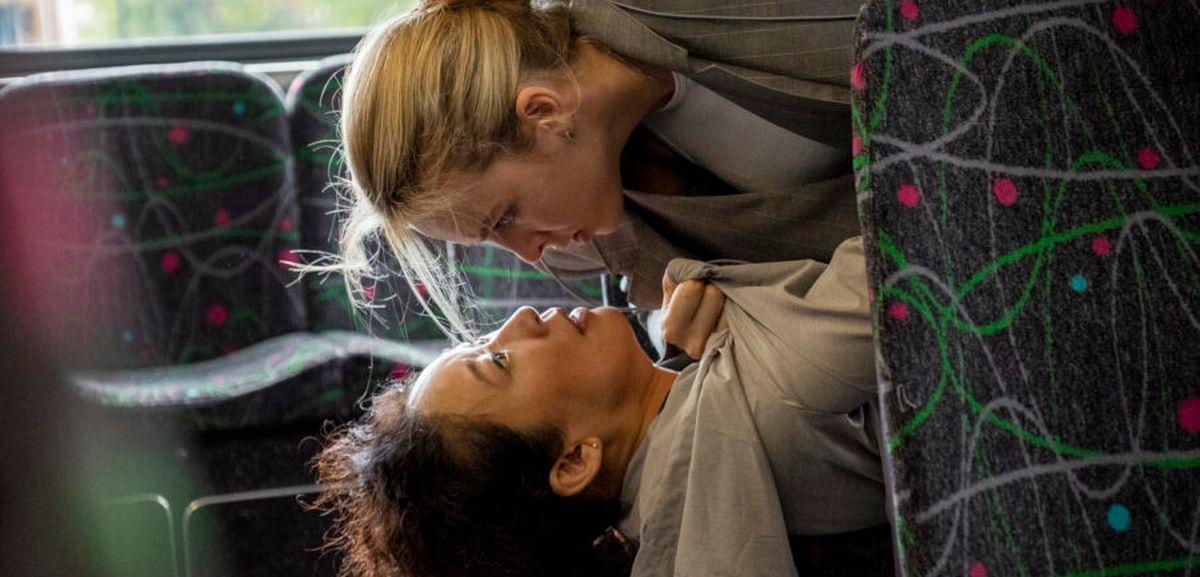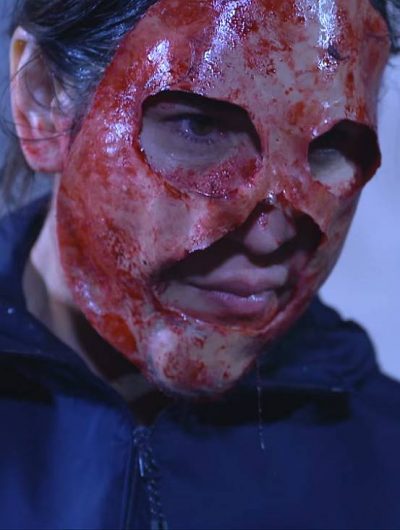Season 4: ★★★★
Season 5: ★★½
“There’s only one way to be safe in this business — be powerful enough that no one can touch you.”
I only just realized that I had not reviewed the fourth series of Queen of the South at the time of its broadcast. I’m not 100% sure why that slipped my mind; it may have been a reaction to the rather underwhelming nature of the third season. In some ways, the show did get back on track – it did, at least, stop trying to fake badly Arizona, largely relocating to New Orleans. This brought with it a new slate of rivals and enemies for Teresa Mendoza (Braga). This was a necessity, the show having sent the main antagonist from the early series, Camila Vargas, into exile at the end of season three.
 The main replacement was likely Cecil Lafayette, a corrupt local judge who seemed to have his finger in every pie, as well as cooking up a few more of his own. He wants an ever-increasing slice of Teresa’s endeavours, as he comes to realize how large her empire is. There’s also Marcel Dumas, a well-established gang leader in New Orleans, who initially wants to co-operate with her. Their relationship becomes increasingly fractious over the first half of the series, and Judge Lafayette sees the opportunity to pit them against each other, while apparently acting as a mediator.
The main replacement was likely Cecil Lafayette, a corrupt local judge who seemed to have his finger in every pie, as well as cooking up a few more of his own. He wants an ever-increasing slice of Teresa’s endeavours, as he comes to realize how large her empire is. There’s also Marcel Dumas, a well-established gang leader in New Orleans, who initially wants to co-operate with her. Their relationship becomes increasingly fractious over the first half of the series, and Judge Lafayette sees the opportunity to pit them against each other, while apparently acting as a mediator.
Meanwhile, inside Teresa’s organization, we see the first inklings of dissension in the ranks. Boaz, who had been running her operations South of the border in Sinalioa, is beginning to show dissatisfaction with Teresa’s approach. But there are new opportunities too. I guess, perhaps to replace Vargas, we get Oksana Volkova (Cherny), who is the public face of the Russian mob in New York, operating on behalf of her extremely reclusive boss, Kostya. She offers a potential pipeline into the lucrative East coast market, from Miami up the coast through Atlanta to the Big Apple, for Teresa and her product. However, there’s opposition to her expansion, in the form of an existing Cuban mob, under El Gordo.
After the weakness of season three, this was a strong return to form. It got back to the basics, of Teresa Mendoza seeking to expand her empire and consolidate her power, despite opposition from existing players. The violence which almost inevitably flows from such a struggle was present in copious quantities, with at least one shocking and unexpected death (well, we only expected it about two seconds before it happened!). In Judge Lafayette, well portrayed by David Andrews, there was a solid villain, whose cunning, along with his local connections and allies, proved a tough nut for Teresa and her cartel to go up against.
Probably my only complaint was our heroine not quite getting as deeply involved in the action as previously. Outside of an assault on the base of some mercenaries sent to kill her, there hardly seemed to be any significant firearms use for Teresa. Perhaps that was an indication that she was beginning to seek an exit strategy, moving into more legitimate businesses, and away from those where killing is a standard technique of operations. The news that the fifth series would be the show’s swansong, seemed to support this theory.
 To start at the end of it, however, the grade for this season loses a full star simply on the basis of its chosen ending. While skirting around spoilers, we utterly called almost every aspect, down to the specific beach-side location of the final scenes, as early as end of the previous episode. Maybe we’ve just seen too many telenovelas in which this particular plot twist has been done to death. There was a real lack of any sense of karmic balance, considering the number of dead bodies Teresa had left in her wake. We also kept hoping, right up until the final credits rolled, that we would get closure for Camila Vargas. If the actress playing her, Veronica Falcón, just wanted to leave the series after #3, the character deserved a far better send-off. Meanwhile, Teresa Mendosa barely appeared in the final episode, which instead focused on long-time sidekick, Pote (Madera).
To start at the end of it, however, the grade for this season loses a full star simply on the basis of its chosen ending. While skirting around spoilers, we utterly called almost every aspect, down to the specific beach-side location of the final scenes, as early as end of the previous episode. Maybe we’ve just seen too many telenovelas in which this particular plot twist has been done to death. There was a real lack of any sense of karmic balance, considering the number of dead bodies Teresa had left in her wake. We also kept hoping, right up until the final credits rolled, that we would get closure for Camila Vargas. If the actress playing her, Veronica Falcón, just wanted to leave the series after #3, the character deserved a far better send-off. Meanwhile, Teresa Mendosa barely appeared in the final episode, which instead focused on long-time sidekick, Pote (Madera).
Up until that point, however, the season had not been terrible. It was fairly broad in scope, mostly hopping between New Orleans and New York, though with a side-trip to “Berlin” [quotes used advisedly, since unlike the Maltese excursion in series three, I’m fairly sure the production did not go to Germany, instead throwing in a couple of bits of stock footage and faking the rest]. As expected, Teresa was seeking to diversify into legal business, in particular property development. Though she quickly found out that “legitimate” did not necessarily mean those involved could be trusted. Still, no problem there, that methods from her usual field of work can’t solve.
Particularly effective was her ongoing dealings with the Russian mob. I will admit, I did wonder for a while whether their supposed leader even existed, since Oksana was the only person who ever seemed to talk to Kostya. There were a number of tense moments, as Teresa tries to convince the Russian to turn on her boss, because the Mexican offers a better long-term future. While Oksana was not up to the level of Camila Vargas, she did offer a good foil. She possessed an impenetrable air, reminding me of the famous Churchill quote about Russia being “a riddle, wrapped in a mystery, inside an enigma.” You just never knew what she was planning.
And so, it all ends – not with a bang, but in a considerably more peaceful way than I expected. I think that. perhaps, after so long, writers tend to fall in love with their characters a bit too much. I’ve lost count of the number of shows, from Buffy through Dexter to Game of Thrones, which have had trouble creating a satisfactory ending, and we can now add Queen to that list. Its departure does still leave a gap on television. In terms of truly bad-ass heroines, prepared to go to any ends to reach their goals, Teresa Mendoza is without parallel. Now, let’s get a US remake of Rosario Tijeras…
Star: Alice Braga, Hemky Madera, Peter Gadiot, Vera Cherny






 It’s weird what you stumble across on Amazon Prime. This is the feature-length version of a web series, originally made in 10 episodes. Just based on the title and description – “Delinquent girls are trained to perform risque but dangerous kung fu fight shows in a Las Vegas now owned and operated by the Chinese Mafia.” – I thought it best to wait until Chris was not around. Mostly because I’m not sure I could have stood the dripping sarcasm. Turns out, I needn’t have worried. Everyone remains attached to their clothes, and it’s resolutely PG-13 rated. Indeed, we actually see very little of the “risque” shows mentioned, which is a bit of a shame: the fragments we see, along with the training clips, suggest it’s something I’d love to attend in Vegas.
It’s weird what you stumble across on Amazon Prime. This is the feature-length version of a web series, originally made in 10 episodes. Just based on the title and description – “Delinquent girls are trained to perform risque but dangerous kung fu fight shows in a Las Vegas now owned and operated by the Chinese Mafia.” – I thought it best to wait until Chris was not around. Mostly because I’m not sure I could have stood the dripping sarcasm. Turns out, I needn’t have worried. Everyone remains attached to their clothes, and it’s resolutely PG-13 rated. Indeed, we actually see very little of the “risque” shows mentioned, which is a bit of a shame: the fragments we see, along with the training clips, suggest it’s something I’d love to attend in Vegas. ★★★
★★★ There’s probably a decent movie in here. An interesting premise, occupying the nexus where religion and science cross, and some very effective hand-to-hand action sequences, would potentially have made for a decent 90 minutes of fun. The problem is, this actually runs for 10 x forty-minute episodes, and the result is stuffed so full of padding, that it could be used as a sofa. The nuns of the title are members of the Order of the Cruciform Sword, a group which has been fighting demonic entities for centuries. Chief among them is the bearer of the Halo, a divine relic which bestows its owner with great powers, including rapid healing and the ability to phase through solid objects.
There’s probably a decent movie in here. An interesting premise, occupying the nexus where religion and science cross, and some very effective hand-to-hand action sequences, would potentially have made for a decent 90 minutes of fun. The problem is, this actually runs for 10 x forty-minute episodes, and the result is stuffed so full of padding, that it could be used as a sofa. The nuns of the title are members of the Order of the Cruciform Sword, a group which has been fighting demonic entities for centuries. Chief among them is the bearer of the Halo, a divine relic which bestows its owner with great powers, including rapid healing and the ability to phase through solid objects. I really must get round to reviewing Wentworth. The Australian women-in-prison drama certainly deserves coverage here, and has provided some of the best television we’ve enjoyed in the 2010’s. I keep intending to do so, but suspect that will now likely have to wait until after the show comes to a conclusion, following its ninth and final season in 2021. In the meantime, however, I do get to review the Turkish remake of the show. If you’ve seen Wentworth, this version is perhaps as unnecessary as any Hollywood remake of a familiar foreign film. Yet there are enough differences – both in story and culture – that I didn’t mind too much.
I really must get round to reviewing Wentworth. The Australian women-in-prison drama certainly deserves coverage here, and has provided some of the best television we’ve enjoyed in the 2010’s. I keep intending to do so, but suspect that will now likely have to wait until after the show comes to a conclusion, following its ninth and final season in 2021. In the meantime, however, I do get to review the Turkish remake of the show. If you’ve seen Wentworth, this version is perhaps as unnecessary as any Hollywood remake of a familiar foreign film. Yet there are enough differences – both in story and culture – that I didn’t mind too much. Nine years after the events of the
Nine years after the events of the  I remember how the first series of Killing Eve blew my socks off, and was completely unlike anything else on television. The second series fell short, but that was unsurprising – how could it be otherwise? – and there was still the chance for it to mount a course correction and recover. This third installment, however, has if anything accelerated the downward trend. What was once must-see television has become something which sits on in the background, typically as I surf the Internet on my phone. I can’t think of another series which has collapsed in such a remarkably brief time-frame.
I remember how the first series of Killing Eve blew my socks off, and was completely unlike anything else on television. The second series fell short, but that was unsurprising – how could it be otherwise? – and there was still the chance for it to mount a course correction and recover. This third installment, however, has if anything accelerated the downward trend. What was once must-see television has become something which sits on in the background, typically as I surf the Internet on my phone. I can’t think of another series which has collapsed in such a remarkably brief time-frame.
 This is the first Thai TV series I’ve seen, and while I suspect it’s not exactly par for the course, I found it undeniably impressive. Behind a generic title, it’s easily the most intense of the telenovelas I’ve seen, regardless of location. [Note: various sources have different names for the characters: for consistency, I’m giving the ones used by Netflix] It’s a long, extended rampage of vengeance, in which the heroine, Maturos (
This is the first Thai TV series I’ve seen, and while I suspect it’s not exactly par for the course, I found it undeniably impressive. Behind a generic title, it’s easily the most intense of the telenovelas I’ve seen, regardless of location. [Note: various sources have different names for the characters: for consistency, I’m giving the ones used by Netflix] It’s a long, extended rampage of vengeance, in which the heroine, Maturos ( The story is told in the context of Maturos’s trial, so we know there’s no question of her getting away with it [that would probably have been a step too far!]. But will she get the death penalty, life imprisonment, or be found not guilty by reason of insanity? The show unfolds in flashback, occasionally interrupted with moments from the trial, telling the story of how she came to be facing multiple charges of murder. It begins with mother and daughter leaving their abusive husband and father. It’s the resulting precarious financial situation, moving them into a flat in a less than desirable neighbourhood, and bringing them into contact with the gang. They accidentally come into possession of a drug stash belonging to the posse, and hand it over to the authorities.
The story is told in the context of Maturos’s trial, so we know there’s no question of her getting away with it [that would probably have been a step too far!]. But will she get the death penalty, life imprisonment, or be found not guilty by reason of insanity? The show unfolds in flashback, occasionally interrupted with moments from the trial, telling the story of how she came to be facing multiple charges of murder. It begins with mother and daughter leaving their abusive husband and father. It’s the resulting precarious financial situation, moving them into a flat in a less than desirable neighbourhood, and bringing them into contact with the gang. They accidentally come into possession of a drug stash belonging to the posse, and hand it over to the authorities. the body count increases, the remaining gang members grow increasingly suspicious, and harder to track. Inspector Patorn is also beginning to put two and two together, and Maturos’s psychiatrist, Dr. Nattha, discovers her patient’s split personality, meeting Roong. Even after Patorn realizes her involvement in the murders, he agrees to let her act as bait to lure in the three remaining gang members, who have escaped from prison and, having reached the same conclusion, are coming for their own revenge.
the body count increases, the remaining gang members grow increasingly suspicious, and harder to track. Inspector Patorn is also beginning to put two and two together, and Maturos’s psychiatrist, Dr. Nattha, discovers her patient’s split personality, meeting Roong. Even after Patorn realizes her involvement in the murders, he agrees to let her act as bait to lure in the three remaining gang members, who have escaped from prison and, having reached the same conclusion, are coming for their own revenge. While initially released as a film, what’s reviewed here is the extended cut, screened as four 45-minute episodes on Russia’s Channel One in May 2016. This is easily available, on both Amazon Prime and
While initially released as a film, what’s reviewed here is the extended cut, screened as four 45-minute episodes on Russia’s Channel One in May 2016. This is easily available, on both Amazon Prime and